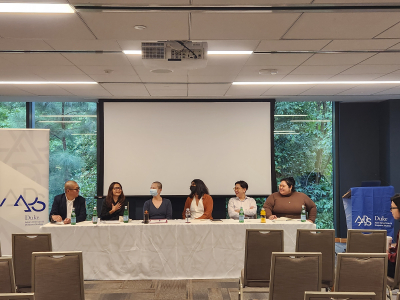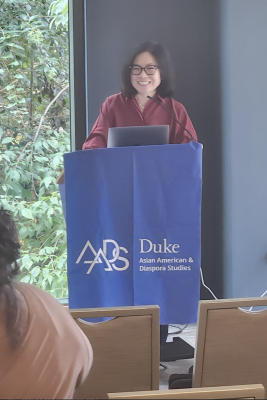AADS Student Worker

The Medical Humanities and Asian American Studies symposium on September 22, 2023 highlighted a growing field picking at the ways that Asian/American bodies and ideologies are bound up with medical spaces, health, and well-being more generally.
It began with a panel, chaired by Emily Rogers (Duke), entitled “Toxicity, Militarism, and Diaspora.” Rachel Lee (UCLA), Cynthia Wu (Indiana U), and Thuy Linh Nguyen Tu (NYU) gave brief talks about the entanglements between war, chemical toxins, and Asian bodies. Lee uses oral histories to trace connections between herbicides, agricultural production, U.S. hegemony, war and migration. Continuing in a thread of militarism, Wu examined Black and Asian “fluid intimacies” during WWII, using blood transfusions as a lens through which to understand Black and Asian racial formulations and solidarities. Finally, Tu documented the effects of chemical warfare on Vietnamese women, and the stories of living through toxicity and repair which arose.

Next, a roundtable entitled “Corporeality, Coloniality, and the Medicalized Body” wove together questions of dis/ability, modernity, Asian American Studies, health, pedagogy, and care. The conversation, moderated by Athia Choudhury (Duke), began with the tensions within Asian American studies around ableism, hyperproductivity, and disability studies. It moved through the idea of the body as a lived ecology of histories and traumas and joys, the role that pedagogies of care play in the college classroom, and paths towards new conceptions of resilience and hope.
Finally, James Kyung-Jin Lee (UC Irvine) gave the keynote speech, “A Winter Coat in the Summer: Mental Illness and the Event Horizon of Asian America.” Lee argued that the crux of Asian American racial formation is able mindedness and able bodiedness, as seen in the model minority ability to exceed expectations without exception. How many minds, he asked, are we willing to abandon to maintain the fiction of this particular genre of “Asian American”? Tracing literary representations of schizophrenia and its ambivalent entropy, Lee presents schizophrenia as Asian America’s event horizon, the condition which threatens to destroy all that for which Asian America stands. He pushes for a horizontal ethics or politics of resistance, where the grammar of ableist liberatory fervor like “stand with” falls away to a world centered around care. As we move towards a more expansive future, how do we do the messy work of reimagining different forms of solidarity?